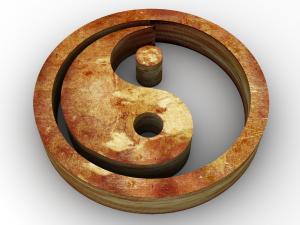Do you think the state of your home affects your daily mood? Strange but true, it probably does more than you know. Though the world gets more interconnected every year, more people are choosing to work right from home. You might not think it affects your creativity to work in a cluttered space, but the truth is that the aesthetics of your surroundings play an important part in how productive you are.
The ancient Chinese understood this dynamic, and it helped to form a philosophy called Feng Shui. In their minds, a well-balanced living space produced well balanced lives. Will following the practices of Feng Shui ease some of the tension in your living space? The only way to find out is to try.
What is feng shui?
The philosophy of Feng Shui is simple; it’s a way to bring harmony to the environment through the intentional placement of everything in it. Literally translating to “wind and water”, Feng Shui is focused on altering the physical environment to create spaces that invite health into your life, encourage happiness and even allow for wealth to find you.
Every object has an optimal place in Feng Shui. When understood at the most fundamental level, it is the idea that the decorations of your physical environment have a big impact on your internal one. By aligning the energy between you and your home, you can direct yourself along the path that you want to go on.
A brief history of feng shui
Feng Shui dates back to ancient China where it survived because it was so easily incorporated into Chinese religions like Daoism and Buddhism. Over 3,500 years ago, Chinese astronomers used the stars to align relations between human physical objects and the greater universe. Important buildings were built along the north-south axis and religious buildings were aligned to be precisely in the angles of the sun during important events like the winter solstice.
Today, Feng Shui thrives in China, despite state-sponsored attempts to stomp it out during the Communist Cultural Revolution. Though the ways that Feng Shui has been used have changed over the centuries, its essence has resisted cultural changes and continues to evolve to fit the requirements of the modern world.
Main principles of feng shui
To understand the basics of Feng Shui, you need to be familiar with the following principles.
Qi: Pronounced like “chee”, Qi is the Feng Shui word for the energy that is constantly moving and changing around us. Qi tends to collect in cluttered corners and places without good flow, where it can have a negative effect on your mood. The main goal of Feng Shui is to control the flow of Qi to maximize happiness and contentment.

Yin and yang: Just like the two sides of a compass, yin and yang in Feng Shui represent opposite ends of the same system. While yin represents the passive, cool and feminine, yang stands for action, heat and the masculine. These opposite complementary forces need to be balanced in Feng Shui, though some spaces can have more of one element than the other.
The five elements: According to Feng Shui philosophy, there are five forces that make up the world: metal, earth, fire, water and wood. Feng Shui is less concerned with the actual physical elements, but instead focuses on the energies within them. Essentially, the five elements are a simple way to describe the colors, shapes and textures in the world. To have an ideal home environment, it’s important to balance the five elements to prevent any of them from overpowering each other.
The bagua: Known as the Feng Shui compass, the bagua is an energy map that helps you understand the connections between different parts of your home in order to understand the Qi energy they contain. There are eight points in the bagua compass, each representing a different part of life and the different energies needed to cultivate it.
The eight sides of the bagua are:
- Fame and reputation
- Power and wealth
- Love and marriage
- Children and legacy
- Compassion and helping
- Work and career
- Wisdom and knowledge
- Family and community
Criticisms of feng shui
Though Feng Shui has withstood centuries of cultural change, modern day scientists are skeptical that it lives up to its promises. Because most evidence for its effectiveness comes from personal experiences rather than rigorous scientific study, many of its claims are unproven. However, those that practice Feng Shui believe that it works, and the improvements that they see in their own emotional health and well-being are all the evidence they need that the ancient Chinese knew what they were doing.
How you can incorporate feng shui principles into your home
Whether you believe all the principles of Feng Shui or not is up to you, but you might be surprised by the difference in your life when you start to follow the main principles. By taking the time to carefully consider how you design your living space and the objects you bring into your home, you can start to follow the principles of Feng Shui.
Below are tips to help you get started with any aspect of your home.
- Play with color: Color is an essential part of Feng Shui and an easy way to change the emotional impact of your living space. Feng Shui calls for warm, rich earth tones to be used throughout the house, like terracotta, coral, copper, light blues and greens and other soft tones. In general, bright reds and oranges are too similar to the yang (masculine side) and should be avoided, especially in bedroom spaces. Bright pops of colors should be limited to accents in otherwise tranquilly colored spaces.
- Shut out the world from your bedroom: Sleep is sacred in Feng Shui, and the bedroom needs to be a space of rest and tranquility. Keep your work laptop and other equipment out of the room and make it a space where nothing happens except for sleep. If you need your bedroom to also function as an exercise or work space, find ways to neatly hide this equipment when not in use. Folding screens or delicate fabric can do a great job of defining different spatial areas.
- Expertly position your bed: You spend a third of your life asleep, so where your bed is located is an important consideration in Feng Shui. The best position for it tends to be far away from but still in sight of a bedroom door, usually at a diagonal. Keep your bed away from low pitched ceiling of heavy beams, as they are believed to contain energy that presses down on you while you sleep. Likewise, keep the sides of your bed off the wall, as that makes it difficult to get in and messes with the harmonious energy between you and your partner. Finally, windows don’t provide the symbolic support that a solid wall contains, so try to avoid placing your bed directly next to one.
- Choose curves, not corners: Square corners point energy all in one direction, making for a sharp environment that can direct negative energy right at you. Fix this problem by opting for rounded cornered furniture whenever possible, especially for nightstands and other bedroom furniture. When buying new furniture isn’t an option, you can minimize corners by using beautiful fabric to cover them.
- Clear the clutter: In Feng Shui, clutter symbolizes unfinished business and can actually prevent you from moving forward in life. Keep your life on track by cutting your possessions down to a minimum and creating space for Qi to flow freely throughout the room. Decorate simply and place plants in the corners of rooms to prevent energy from stalling there. Finally, don’t use the space under your bed to contain clutter. According to Feng Shui experts, this space has its own energy that can easily disturb your sleep patterns.
- Manifest beauty through possessions: An important component of Feng Shui is choosing to surround yourself with objects that represent what you want in your life. Decorate your home with beautiful, meaningful objects that encourage you to aspire to reach your goals. For example, the best place to put your favorite piece of artwork is against the wall opposite your bed so that it’s the first thing you see when you wake up.
- Play with mirrors: Mirrors have lots of significance in Feng Shui because they are an easy way to recirculate energy throughout a room and enhance the effects of natural light. However, simply placing mirrors any place you want them isn’t enough. You need to carefully consider each location to ensure that the mirror reflects back a beautiful image and that they are positioned high enough that you can’t look at yourself while seated. Another spot to keep mirrors away from is next to your bed or on the ceiling. Ceiling mirrors bounce too much energy around the room and will disrupt your rest, even in the dark. To control the energy that mirrors have, treat them like windows and cover them with drapes when not in use.
- Experiment with lighting: Light is incredibly important for Feng Shui and your light needs will change throughout the day. Try to incorporate as much natural light as possible in your home throughout the day and incorporate soft light into the evening. Cover windows with easy-open draperies that make it simple to let in light during the day but close them up to create a cozy space in the evenings. Artificial lighting should come from a variety of sources, including overhead, table and wall lights. Dimmers are best of all because they allow you to control the intensity of light into the evening.
- Tasteful furniture arrangement: When it comes to the placement of your furniture, your main concern should be the flow throughout the room. The room should be set up so that you don’t run into any furniture when you walk through. Try to prevent yourself from hitting the backs of furniture when you walk in and make sure there is always a clear walkway through the room. Make it easy to have conversations with others by keeping the furniture close together and not placed far away from each other. The best place for large pieces of furniture like couches is against a solid wall and far away from the room’s entry. Be careful where you put a TV, as they tend to dominate a space and become too much of a focal point. Keep TVs out of bedrooms and try to mount them discretely on walls to keep them from taking up too much space.
In summary
Whether or not you believe the every claim of Feng Shui, there is no denying that tastefully designing your living space can make a big difference in your mood and energy levels throughout the day. If you’re ready to make a change towards a more relaxed home environment, take the time to incorporate some principles of Feng Shui into your life today.
